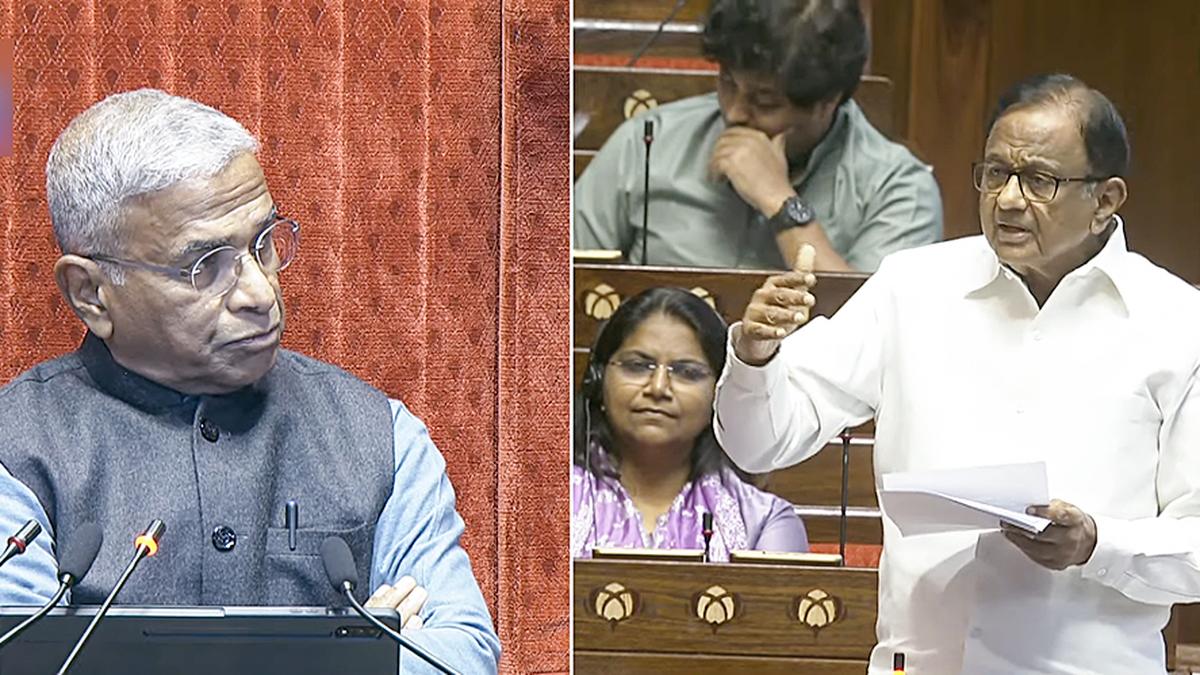Rajya Sabha Deputy Chairman Harivansh Narayan Singh listens to Congress MP P. Chidambaram on March 27, 2025. Photo: Sansad TV via ANI
Expressing concern over the “tariff war” looming over the global economy after U.S. President Donald Trump’s recent announcement, Opposition members in the Rajya Sabha on Thursday (March 27, 2025) asked the Centre if it had any specific plans to deal with the threat.
The MPs raised the issue during a discussion on the Appropriation and Finance Bills. Senior Congress MP and former Finance Minister P. Chidambaram, who initiated the debate on the Bills, urged the Centre to clarify the country’s response to Mr. Trump’s statement that he would impose reciprocal tariffs on April 2, 2025.
He said the Centre should discuss the issue in Parliament or consult the Opposition parties on the matter. “What is the government’s response? What is India’s response? There has been no statement of policy, no discussion in Parliament, no consultation with Opposition parties. The government is holding its cards close to its chest, if it has any cards at all,” he said. He warned the government that a tariff war would lead to a trade war, hurting the whole world.
Addressing the members’ concerns, Union Finance Minister gave a detailed account of the recent reduction in basic customs duties and other tariffs, adding that these were not in response to Mr. Trump’s announcements. However, Mr. Chidambaram attributed it to the “Trump effect”.
Ms. Sitharaman said that by bringing down the customs duty or by removing it completely, the Centre was actually helping small and medium industries that import intermediary goods or raw materials, mainly for producing some goods, which they in turn export. “We have actually helped the manufacturing sector,” she said, adding that the Centre had used the opportunity to rationalise the tariff structure and address the duty inversion. “Through this, there will be more domestic value addition in industries, it will promote exports, facilitate trade and provide relief for common people,” she said.
She maintained that the Finance Bill proposes to remove seven customs tariff rates for industrial goods. “Two tranches of rationalisation of customs rate rationalisation has happened. They have reduced the number of tariff rates from 21 to eight, completely bringing them down – including the zero-rated ones. Many Indian exports will now become more competitive as the cost of imported inputs will be completely reduced,” the Minister said.
Either a cess or surcharge will be applicable per item, she said, citing the example of social welfare surcharge, which will be exempted on 84 tariff lines that are already subject to a cess. “Thirty-five additional capital goods for production of electric vehicles (EV) battery manufacturing and 28 additional capital goods for mobile phone battery are now being added to the exempted goods list. They are not going to be taxed any more. We will be enabling the production of EV and mobile phone batteries,” she said. Cobalt powder and waste, scrap of lithium iron battery, lead, zinc and 12 more critical minerals, in addition to 25 critical minerals, were fully exempted from basic customs duty in the Budget in July 2024.
“Consistently, budget after budget, we are coming up with reduction of duties so that India’s aspiration to become a manufacturing hub is supported,” she said. “I heard members saying that the tariff war has started and these things are done as a response to the tariff announcements made by President Trump. No. We have been doing this from 2023. Steadily, every year, new items are being brought in keeping in mind Atmanirbhar Bharat for the requirements of a developed India. Simplifying customs duty and compliance details… This is an ongoing process. It has nothing to do with today’s global situations. But the process will continue in the future,” she said.
The Minister said there were two types of equalisation levies. “The 6% levy imposed in the financial year 2016 and the 2% imposed in 2020, which were applicable before July 2024 itself. The 2% levy was removed after stakeholder consultations in the July 2024 Budget to ease the compliance burden. That was much before President Trump took office. The 6% levy is being removed as part of that process,” she said.
Mr. Chidambaram acknowledged that the Finance Minister had made significant reductions in basic duties. “Thank God, at long last, the government is giving up protectionism. We have screamed from the rooftops that protectionism is not the way to protect the economy. They are mixing up protectionism and patriotism. Protectionism is the antithesis of free trade,” he said.
Trump’s reciprocal tariffs: What are India’s options?
Mentioning the customs duty reduction on items such as Harley Davidson motorcycles, he asked whether it was a genuine change of policy. “I don’t believe so. I think this is the effect of Mr. Donald Trump,” he said, adding that concessions and flattery had failed to convince Mr. Trump.
Trinamool Congress’s Sagarika Ghose, CPI(M)’s John Brittas, Congress’s Rajeev Shukla and Renuka Chowdhury also shared similar concerns. The BJP’s R.P.N. Singh said it was not possible to speak on the issue [reciprocal tariffs] till it was implemented. “We will be able to talk about it only after it is implemented after April 2,” he said.
Both the Bills were returned by the Upper House later on Thursday.
Published – March 27, 2025 11:54 pm IST
